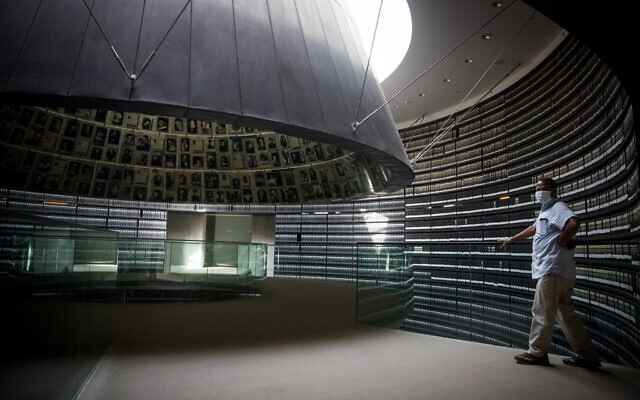Israel’s famed Yad Vashem Holocaust memorial and research center is facing dire financial straits because of the double hit of Israel’s ongoing political deadlock and the pandemic, which have frozen government funding and dried up revenues from visitors.
The museum says it hopes to finish the 2020 fiscal year with a balanced budget by instituting temporary spending cuts and dipping into financial reserves until the government releases promised funds.
Yad Vashem’s struggles come amid considerable resistance to the appointment of its next director, former right-wing politician and ex-general Effi Eitam, whose nomination for the post by the Israeli government has drawn criticism for his past statements about Palestinians and Arab Israelis.
Cabinet sources confirmed to The Times of Israel on Monday that Eitam’s candidacy is one in a long list of senior appointments held up by the ongoing deadlock between the Blue and White and Likud parties.
There are no immediate indications that the delay in Eitam’s appointment is due to the row surrounding his candidacy, sources said. Blue and White is said to be refusing to allow his appointment to come up for a necessary cabinet vote as part of a larger tit-for-tat standoff that has prevented the appointments of a national police commissioner, a state attorney, a Prime Minister’s Office director-general, senior health and justice officials, and more.

Avner Shalev, chairman of the Yad Vashem Museum, during a press conference at the Keren Hayesod headquarters in Jerusalem, on December 8, 2019. (Hadas Parush/Flash90)
But the delay could further hamper the institution’s efforts to get back on its feet.
Its 27-year director, Avner Shalev, himself a former brigadier general and ex-government official, announced in June he would retire at the end of the year.
He leaves behind an organization that has grown tremendously under his tenure, opened new research and educational arms, and positioned itself as a major international clearinghouse for Holocaust education and study.
But the pandemic has dried up the income from visitors — entrance is free, but guided tours and gift shop spending make up some 10 percent of the museum’s revenue — and the political deadlock has dried up another: the 35% of the museum’s budget that comes from the government. The government has failed to pass a 2020 and a 2021 budget, leaving many key public institutions to fend for themselves without access to funds already allocated to them.
Reached by The Times of Israel, Yad Vashem released a statement it asked be cited in full.

Effie Eitam speaks during the Gush Katif conference at the Tel Aviv Museum on March 23, 2017. (Yossi Zeliger/Flash90)
“Approximately 35% of Yad Vashem’s annual budget comes from the State of Israel; 10% from self-generated income; and over 50% from private and corporate donations, from Israel and worldwide,” the statement reads. “Since 1993, under Avner Shalev’s chairmanship, the Yad Vashem budget has been consistently balanced, allowing for the establishment of supplemental endowments and emergency funds.
“As for 2020, Yad Vashem has not yet received the majority of the annual funding budgeted by the State of Israel for this year. Due to the global health crisis and the ensuing absence of visitors, local or foreign, Yad Vashem has suffered a decrease in its own income-generating capacity.”
It goes on: “Following the onset of the coronavirus pandemic, Yad Vashem took immediate steps, including significant spending reductions and limited withdrawals from Yad Vashem reserve funds. These measures, when combined with the eventual transfer of the funds already committed, but not yet remitted, by the State of Israel, as well as Yad Vashem’s ongoing fundraising efforts, will enable Yad Vashem to remain balanced for the 2020 fiscal year.
“A major budget challenge awaits Yad Vashem with the start of the 2021 fiscal year, one that will require continued support by the State of Israel, worldwide donors and a hopeful return to regular on-site activities.”
The nomination of Eitam, the former brigadier general, has drawn a flurry of criticism.

Yad Vashem security guard stands at the empty Hall of Names in the Yad Vashem Holocaust Memorial Museum in Jerusalem on April 19, 2020 amid the coronavirus pandemic. (Yonatan Sindel/Flash90)
Earlier this month, in the latest protest against Eitam, a broad coalition of 750 Jewish studies scholars and directors of Jewish and Holocaust museums signed a petition opposing the proposed appointment.
His critics say he is unfit to lead Israel’s Holocaust memorial because he is accused of calling for most Palestinians in the West Bank to be expelled and for Arab Israelis to be excluded from the country’s political system. Critics have also noted the severe reprimand he received for permitting beatings of Palestinian protesters in the West Bank during the First Intifada, a policy that led to the killing by soldiers under his command of a Palestinian detainee.
His supporters, especially those responsible for his appointment, have insisted his comments about the Palestinians were taken out of context and came in the midst of the bombing waves of the Second Intifada, and those targeting Arab Israelis referred only to Arab Israeli MKs and were uttered during a contentious Knesset debate.
They point to his decoration for valor for helping to defend an outgunned base on the Golan Heights during the 1973 Yom Kippur War and his long record as an exemplary and courageous officer.
Colette Avital, a former Labor MK and head of the main Israeli Holocaust survivors organization, and the US-based Anti-Defamation League have called for his name to be withdrawn. With the petition, they were joined by scholars including Susannah Heschel and Deborah Lipstadt. The list also includes the current or former directors of the Buchenwald memorial and Jewish museums in Budapest, Warsaw, Munich and elsewhere.
Related posts:
Views: 0
 RSS Feed
RSS Feed

















 November 30th, 2020
November 30th, 2020  Awake Goy
Awake Goy  Posted in
Posted in  Tags:
Tags: 
















